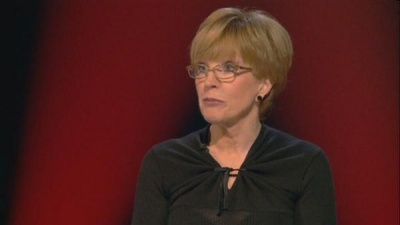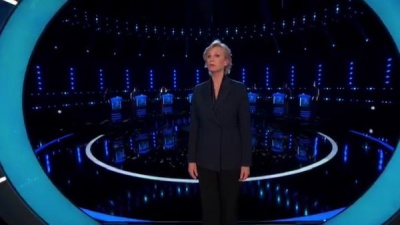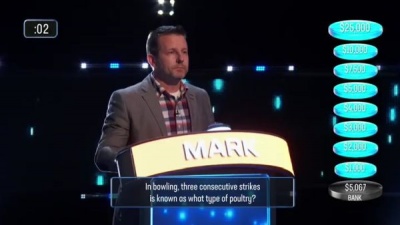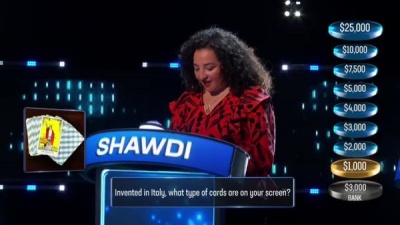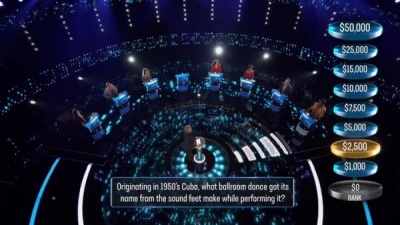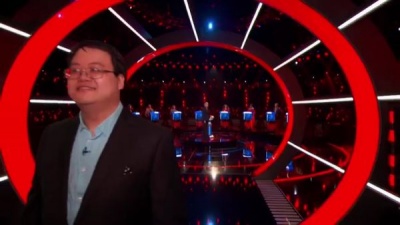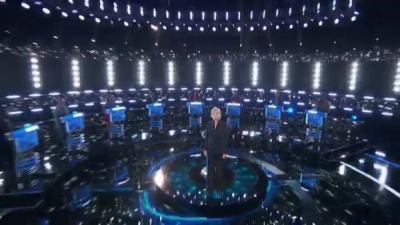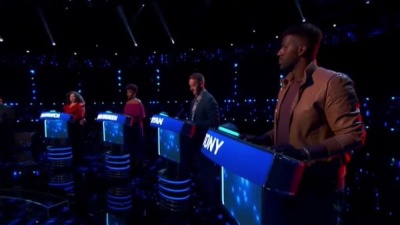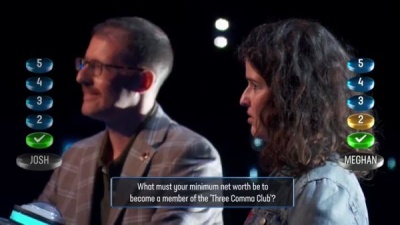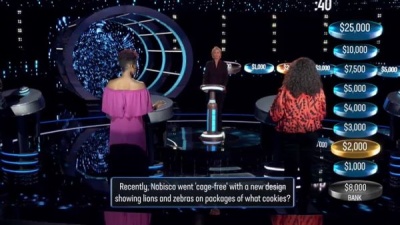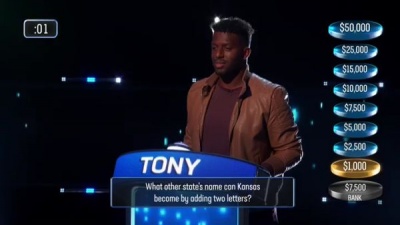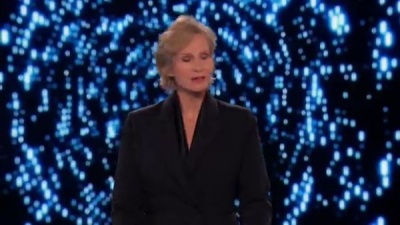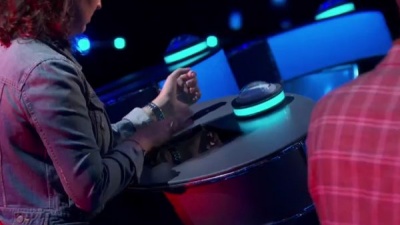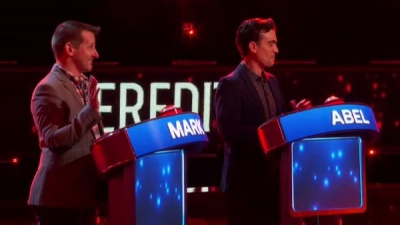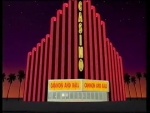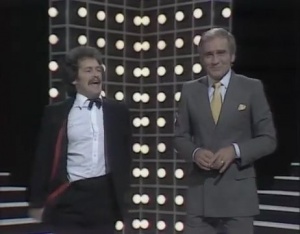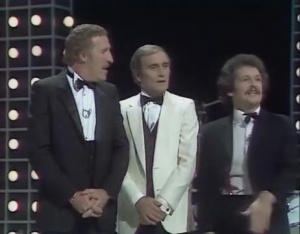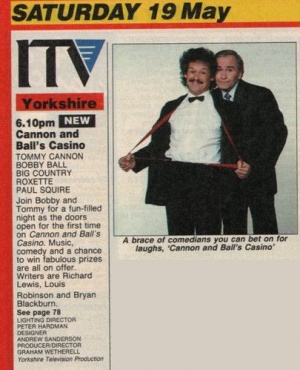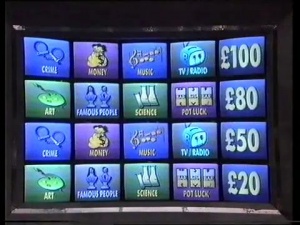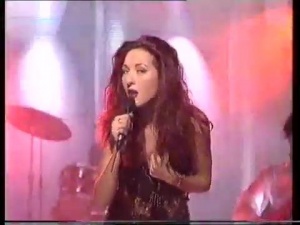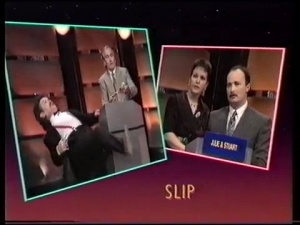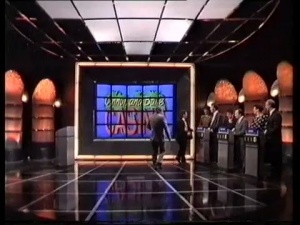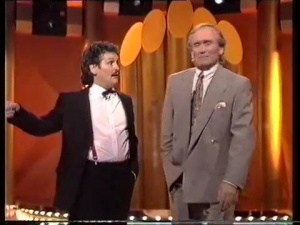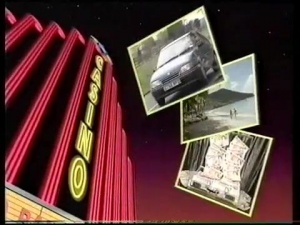Weaver's Week 2020-11-08
Last week | Weaver's Week Index | Next week
"Tonight, I bring you eight contestants with dreams of becoming rich. Then again, they had dreams of being an astronaut, having a pony... But for one of them, finally, a dream will come true. In a nightmare battle of trivial knowledge, the other seven will be sent home. Their fleeting fantasies of fortune unfulfilled, on..."
Contents |
The Weakest Link
BBC Studios in association with Universal Television Alternative Studio for NBC, from 29 September
A short timeline of the show's history.
August 2000: The Weakest Link arrives on television, unheralded, in a BBC2 afternoon slot. It's an instant hit, it proves that intense and backstabby quizzes work at teatime. By Hallowe'en, it's on primetime BBC1; by Christmas, celebrities are playing.
2001: The Yankees snap up the show. Anne Robinson hosts The Weakest Link on NBC primetime. It's a phosphorous show, burns brightly for a short while then fizzles out.
2002: George Gray takes The Weakest Link into syndication. It splutters on for a couple of years before falling off air.
Mean shows (Dog Eat Dog, Divided) clog up the schedules for much of the aughts, until they're swept away by the gentle fun of Pointless and The Chase. The Weakest Link continued here until 2012, and had a one-off charity revival in 2017. Now the Yankees have brought it back.
There's a new host. Jane Lynch is snide and acerbic and openly contemptuous of the contestants. A comedian and actor, Jane is most famous as Sue Sylvester on singing drama Glee.
The basic rules are as we remember them: form a chain of correct answers to reach the target figure. An incorrect answer loses all the money in the chain. You can bank the money on the chain before hearing a question; this starts a fresh chain from zero. Only money banked before time runs out goes into the prize pot. After each round, the players vote to remove one player: whoever gets the most votes is eliminated.
What do we notice about NBC's new version? They push a button to bank money, as well as saying "Bank". It's a clear visual signal, and something they can measure against Jane Lynch's delivery. No need to argue if someone said "Bank" in time, it's all there on the tape.
Questions appear on screen for us viewers at home. This allows us to play ahead, work out the answer before Jane has finished asking the question. We might get a sense of smug superiority, a little extra thinking time, or a chance to appreciate the wit of a good question. Some of the questions have picture cues, displayed on the contestant's podium.
Jane will banter with the players both before and after the votes are revealed. Her remarks are gentle digs, made with a slight edge of humour. It's more pantomime than anything actually hurtful. "How old were you when you went to college?" "Eleven." "Oh, for goodness' sake!" It's no longer the "mean old harridan" from Anne Robinson, Jane plays a malevolent character who would rather be anywhere else than here. Jane Lynch is evil in the camp tradition of Grotbags and Fenella; Anne Robinson had the disturbing demeanour of Pendragon and Bronson.
The clock disappears from screen after about 30 seconds of the round, reappearing only in the last half-minute. The remaining contestants are allowed to say "byeeeee!" to eliminated folk as they leave, and the confessional interviews are played over footage of the contestant leaving. It helps to keep the running time concise, or leave more time to get to know the players.
There are some swooshy new sound effects, Paul Farrer has tweaked his music, made it more contemporary. The original remains one of the greatest game show music scores, these updates keep the familiar motifs while adding the effects we've come to expect – a soft thump when the contestants bank money, a thud as the chain explodes. Most hearteningly, the new music is still just right for the show they've made.
They've also got some new visual effects: lights indicate whose question it is, there are LEDs on the podium, and sparkling lights around the set. The look and feel has some resemblance to the Fifteen-to-One revival with Dame Sandi Toksvig, though the set is so much darker. Eliminated players walk off down an open tunnel, circles with struts between them.
Voiceover is from Debra Wilson, whose voice is very similar to Jane Lynch's. This is either an error or a deliberate choice by the producers, and possibly both.
Who's playing at Chequers when the rest of us are playing chess?
While they've got most of the elements correct, the money chain is wonky. For the first round, it starts at $1000 (£770, €850), then increases at $1000 per question until $5000. Then it's $7500, $10,000, to the round's target of $25,000.
Over here, the traditional chain ran 20-50-100-200-300-450-600-800-1000. Multiply by 5 for the celebrity shows they made, in slots where they now make Pointless Celebrities. It quickly became clear that you want to bank after three or four questions, that's where the climb starts to taper off.
Some shows used an eight-player chain, worth 50-100-200-500-1000-1500-2000-2500. Again, the first link is worth 2% of the target; again, the fourth link is worth 20% of the target and is a sensible place to stop. But then so was the fifth link, 40% of the target and still doubling.
NBC's new version is 1-2-3-4-5-7½-10-25. First link is 4% of the target, fourth link is 16%. There's no particular reason not to bank after every single correct answer, except that the questions in this round are easy and you could risk it all the way to the jackpot.
Next round: 1-2½-5-7½-10-15-25-50. That's 2% and 15%; you may as well bank after every two correct answers. Then it's the mindbending 1-2½-5-7½-10-25-50-75, still saying bank after two right. Round four continues to raise the stakes: 2½-5-7½-10-25-50-75-100, and we're back to banking every correct answer.
Round five, four players, and an interesting strategy question. 2½-5-10-25-50-75-100-250 is the chain, and for the first time, four right answers pays ten times as much as one correct answer. Will the contestants have worked out that they need to bank late, or will they still push the button at random, but rarely at the right time?
The round of three runs at 2½-5-10-25-50-100-250-500. Again, bank after four right answers appears to be the optimum strategy. The round of two? There is no round of two: once the final "weak" link is voted out, we go straight to the final.
Whose brains would zombies take a pass on?
Before the series aired, there was a rumour that the strongest link would have some sort of "immunity" in the votes. This wasn't correct, strongest links can and are voted off without penalty.
Imagine you are a good contestant, but there's someone a lot better than you. In the early rounds, you do enough to keep your place, perhaps do a lot of banking and get one wrong. You'll get rid of the useless players, those who know nothing, because strategy later needs you to go round the circle a lot.
At the round of three, you've identified your main threat, the person you will surely lose the final to. And you've identified the preferred competition, someone you think you could beat in the final. Your preferred opponent will have run a similar calculation, and will have identified the person they reckon they'll lose to. Both of you have concluded that smart Alec has to go, and so smart Alec goes.
If they had a cash round with two players, this would not be such an obvious best strategy. You want to win the pot against the weaker opponent, but you stand to win much more if you can fluke it against the stronger opponent. The weaker opponent won't help you add to the current bank, the better player will. It's not so obvious now, do you risk it against the better player or settle for the prize you have? There's no glib answer.
And if there were a penalty for removing the strongest player – say, your bank for the show was halved – the calculus changes again. A slim chance of lots, or a good chance of much less? We don't like the idea, The Weakest Link works perfectly well without it, and it would be a rule patch to fix an earlier producers' error.
One reason why they've done away with this last round is the size of the prize. The show advertises a prize of $1 MILLION. They might give that much away across the series. Most show's prize pots are in the vicinity of $50-70,000. That's 1½ to 2 years' salary, enough to turn people's heads without being insta-retirement money. In this column's view, it's a good and sustainable prize; in the hyperbolic world where NBC makes shows, it's peanuts.
Other money-saving rules are in effect: the contestants are not allowed to interrupt Jane's questions, or push the "Bank" button before Jane has said the question is correct and called the next player's name. At the end of the round, that can easily stop players from adding money to the pot.
Jane's questions are not unreasonably long, though they've more ornamentation than quick-snappers on The Chase. But she doesn't read them at a great pace, it's no faster a brisk walk. Our sample episode had 74 questions in 31 minutes of the main game, plus 6 asks of "who do you think is the weakest link?" That's a rate of 2.58 questions per minute – or just 62% of the quiz-me-quick 100% pace. It's as fast as The Chase or modern University Challenge, but Anne Robinson was able to get as fast as 100% on a good day. (We covered this in more depth in 2016.)
The pace is further slowed by some contestants, the ones who showboat when answering the questions, and give really long pauses when thinking. To bank and pause before giving the right answer is forgivable; to wait an aeon before costing the team $25,000 earns a ticket home.
Who is in no danger of being arrested by the thought police?
The final remains a best-of-five penalty shootout, play passes between the two players. David Young's hallmark finale is still in use, unlike the prisoner's dilemma. And, as we might expect from NBC, it takes f-a-r too long to ask ten questions.
We're not impressed with the bright starfield behind Jane, it dazzles our eyes and overshadows the host. The show needs a little bit more speed and zip, somehow letting Jane fit in one more question each round would be wonderful.
What with one thing and another, they've filmed The Weakest Link without an audience, which always makes for a more claustrophobic and intense experience. But then they spoil it by using Canned Crowd™, applause and cheering from an unseen audience.
The changes to the cash ladder are what they are, they dangle a carrot in front of the contestants and ensure they can never eat it. We'd expect nothing less from television producers. NBC wants to flash the cash without ever drawing it out of the bank, like the dodgy car dealer who orders big dinners then whacks the bill on the company credit card.
But with a clear strong link certain to be voted out somewhere, and the final generally being between two middling players for a few year's wages, NBC hasn't created must-see television. There's no jeopardy in the prizes, little jeopardy in the winners. Are we meant to tune in for Jane Lynch being malevolent? Again?!
The Weakest Link does not need to be a million dollar show. It would work perfectly well as a $250K show, and still give away the same sort of actual prize. But it's less attractive than a million bucks. And, for us, that's the problem: NBC's The Weakest Link has made a promise it has no intention to keep. We don't like deceptive shows, even when they're as solid and watchable and generally sound as this is.
Can we expect to see the show over here? Almost certainly: broadcasters cannot resist cheap and ready-to-air shows from the other side of the pond. And they're right to grab it, this show is worth a watch. Where will it go? Our guess – up to NBC's owner Comcast, down to their European arm Sky, and we would place it on the Challenge channel in primetime. But that's just our guess, we'll have to see what actually happens.
But one thing is clear. When the votes have been counted – when all the votes have been counted – there's only one thing to say to the loser.
Cannon and Ball's Casino
Yorkshire Television, summer 1990
Once upon a time, there was a jazz trio called The Harper Brothers. They played gigs around their day jobs as welders in Oldham. Robert Harper sung, Thomas Derbyshire was on drums, and they had a pianist. As Bobby explained it, "After a while the pianist left and Tommy and I stayed together as a singing duo singing mainly rock n roll. We turned to comedy because we realised the comics got three quid more than the singers.”
The double act rose through the Lancashire working men's clubs. An appearance on Opportunity Knocks failed, they came stone last. They were more successful on variety show The Wheeltappers and Shunters Club, effectively a Lancashire working men's club on the telly. From this, they were signed up for Bruce's Big Night, where they were always billed and never shows. Cannon and Ball got a regular series on ITV in summer 1979. The network promptly went on strike.
From this cursed start, Cannon and Ball survived and thrived. Their eponymous series had heart and gusto, under the expert production of David Bell. Quickly rising to be familiar stars, they held down summer series and Christmas specials through the decade. Cannon and Ball often contributed to panel shows – either together or apart. As the 1980s wore on, the duo struggled – their sketches were tired, the romantic ballads were schlocky, attempts at a sitcom didn't work on screen. They moved from London Weekend Television to Yorkshire TV, and were given range to explore other parts of light entertainment.
All of which brings us to their one attempt to host a game show. Cannon and Ball's Casino, a show they could only make in 1990. Familiar comedy stars host a quiz show with cabaret elements, with guest appearances by Steve Coogan and hip bands like Jesus Jones.
“We’re thrilled at getting the show and even more delighted that it’s got an entirely different format from any other quiz show,” Bobby Ball told TV Times. “There are three sets of contestants and three rounds. For the first time they have to choose the prize they want to win before the first question is fired.”
Casino delivered on this – limited – pledge. After a Cannon and Ball comedy skit, and a brief chat with the contestants, each couple was asked for their pick of star prize – £4000 cash, a new car, or a holiday in the tropics. It's a game for three couples, seemingly all young professional pairs.
Round one is questions on the buzzer. A "fruit machine" displays the subject, and the value from £40 to £100. (Modern equivalents? £100 to £250.) Our couples buzz in to answer the question, right answer wins the cash, wrong answer sees it thrown open to the other teams.
Some of the questions carried a "spot prize", something desirable like a 650 Watt microwave oven. (£170 from the 1990 Argos catalogue; a similar model's now £45.)
Whoever's got the least money after about ten questions is out of the game, and leaves with any cash they've earned. A quick chat with Cannon and Ball, and then we're treated to the first cabaret act. In one sample episode, it's Brummie punk band Fuzzbox with their new single "Your loss my gain", it'll crash into the top 100 at number 100.
After the ad break, we're back to the quiz. The hosts will attempt to give clues to things like sporting terms. Tommy Cannon will shout related words, Bobby Ball will do the physical comedy at which he excelled. One minute for each team to rack up the right answers, paid at £30 a pop.
Again, the team with least money leaves us now, before another cabaret act. This one's a comedian, riding the laughter from Bobby's antics a moment back. It could be the hip and happening Rob Newman from The Mary Whitehouse Experience, it could be this up-and-coming chap called Bradley Walsh who will never darken our teatimes again.
The winning team is now going to go for the prize they named at the start of the show. Five general knowledge questions will be asked, the answer to each is a number. If the contestants give the right answers in a minute, they'll unlock "The Safe", and win the big prize they chose. If not, they keep the money from earlier in the show.
And, to ramp up the tension, they'll insert the star cabaret turn between asking the questions and giving the answers. It's a pop performance by someone you might have heard of, like Roxette singing their massive hit "It must have been love (Christmas for the broken-hearted)".
Cannon and Ball‘s Casino was meant to go out on Saturday evenings from mid-May to mid-July. The penultimate episode was displaced by a match involving the England men's football team, and the final episode was also removed from the schedules – they went out in August. The series wasn't renewed, and Cannon and Ball saw out their contract with Yorkshire TV on sitcom The Plaza Patrol.
Time hasn't been kind to Casino. Like its rival on BBC1 Takeover Bid, the show looks tired and feels dated. The show's big gimmick is the "fruit machine", a bank of 20 television screens that are used for about five minutes and never again. Even that was unsatisfactory, as most of the screens are set to be permanently off.
The show never took advantage of having two presenters. Michael Hurll had a maxim – “The first rule of all game shows is never have two presenters. No game show will ever work with two presenters, because you want one host against one contestant or two contestants. You cannot split the attention of the public.” We don't entirely agree, but it's a good rule of thumb, and you need a great reason to break it.
We've seen in recent years that double acts can work well – just ask Osman and Armstrong – but there's got to be a strong narrative reason for two hosts. Splitting the duties in the second round – playing to Cannon's strength and to Ball's strength – made it the best element of the programme. Asking a question in turn, as they do in the rest of the show, is not a good reason.
Apart from those two minutes, it's a stale and uninspiring game. There's clearly a budget on the show – around £1000 in cash, £300 in spot prizes, and a big prize worth about £5000 they want to give away most weeks. The mixture of quiz and variety gels better than we feared, and the booking policy was a refreshing mixture of the new and the familiar. This might reflect the experience Yorkshire had had on 3-2-1, the long-running variety show had only been off the air for a couple of years.
Replaced on television by new stars like Hale and Pace, and disillusioned by the vapid showbiz world, the duo turned to faith. As born-again Christians, Cannon and Ball toured giving lectures mixing comedy with faith testimonials. Bobby Ball continued to act on television, on Mount Pleasant and as Lee Mack's father on Not Going Out. The duo continued to tour a secular show, playing in packed theatres to families. Their spring tour was postponed, and rescheduled for this autumn, but curtailed by Bobby Ball's death last week. He is survived by both of his wives, three children, 10 grandchildren and two great-grandchildren.
In other news...
Answers to the questions in the pictures: Turkey!, tarot, Arkansas.
The Chase is on ABC (Disney) has ordered a series of our teatime favourite The Chase. The role of The Chaser will be played by James Holzhauer, Ken Jennings, and Brad Rutter, three of the strongest Jeopardy! players of all time. The role of Bradley will be taken by Sara Haines, an entertainment reporter.
John Sessions died this week. The comedian and actor was a regular on Channel 4's Whose Line is it Anyway? in the early 1990s.
The Diamond Dozen AMPTV ("Armenia") have withdrawn from this month's Junior Eurovision Song Contest, as there's a curfew owing to the war in the broadcaster's territory. We haven't yet heard Maléna Fox's song, but she promises to release it soon. Only twelve broadcasters remain for the contest, and while we await to hear the GPB entry ("Georgia"), we suspect everyone's trying to work out how to get to Astana.
More children's commissions Great news for Cbeebies viewers and their parents: we're getting more Swashbuckle, and more Gigglequiz. For older viewers, The Dog Ate My Homework is also back, with Lauren Layfield the permanent host.
Ahead of the new I'm a Celebrity series next week, there's a history of the show (ITV, Sun). Victoria Coren Mitchell is moving: Only Connect is on at the earlier time of 7.30 (BBC2, Mon).
Over on BBC1, a new series of Masterchef The Professionals (from Tue). There's a University Challenge Children in Need special (BBC2, Thu). Back next weekend: Pointless Celebrities and The Hit List in a celebrity edition, The Wall and The Voice final.
We don't intend to publish next week, so watch out for Famous Family Fortunes (ITV, Sun 15th), and new daytime quiz Winning Combination (ITV, from 16 Nov). We'll be back on 22 November, with a look at Channel 4's The Bridge.
Photo credits: BBC Studios / Universal Television Alternative Studio, BBC, LWT, Yorkshire TV.
To have Weaver's Week emailed to you on publication day, receive our exclusive TV roundup of the game shows in the week ahead, and chat to other ukgameshows.com readers, sign up to our Google Group.


